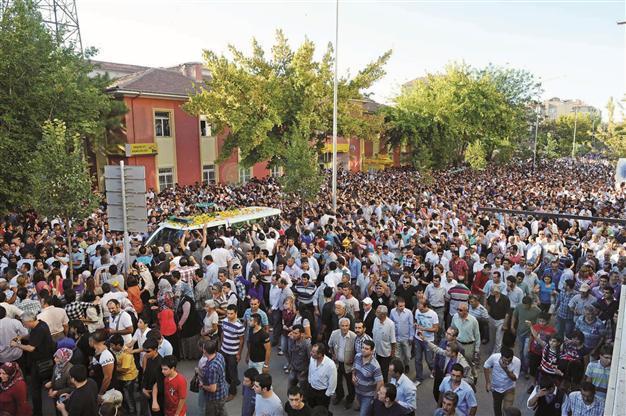Turkey bids farewell to ‘Plectrum of the Steppe’
KIRŞEHİR - Hürriyet Daily News

Funeral prayers were held for Neşet Ertaş at the Ahi Evran-ı Veli Mosque in downtown Kırşehir on yesterday afternoon. DAILY NEWS photos, Selahattin SÖNMEZ
Few Turkish artists could have marshaled such a large spectrum of mourners in the wake of their demise as Neşet Ertaş, a legendary Turkish folk singer and poet.
Ertaş died Sept. 25 at the age of 74, after spending two weeks hospitalized in intensive care in the Aegean city of İzmir. He had been receiving treatment for cancer for the past two years.
Ertaş was known as the “Plectrum of the Steppe” by his fans and fellow musicians for decades. The origin of the epithet was the subject was the subject of speculation for years, but was eventually revealed in a story published on Ertaş’s official website, according to which prominent Turkish writer Yaşar Kemal coined the title “Plectrum of the Steppe” for the poet.
Ertaş’s body was initially brought by air to Ankara, after which dozens of cars formed a convoy to follow the late poet to his hometown, the central Anatolian town of Kırşehir, on Sept. 26. Funeral prayers were held for him at the Ahi Evran-ı Veli Mosque in downtown Kırşehir on the afternoon of the same day.
Ertaş’s funeral became a rare event at which thousands of people from different corners of Turkey, as well as artists, intellectuals and politicians stood side by side for the Turkish folk music master. Prime Minister Recep Tayyip Erdoğan, main opposition Republican People’s Party (CHP) leader Kemal Kılıçdaroğlu, Deputy Prime Minister Beşir Atalay and Culture Minister Ertuğrul Günay, as well as singers Arif Sağ, Orhan Gencebay, Bedia Akartürk and Edip Akbayram were at the ceremony to bid farewell to Ertaş.
‘We need the unity and solidarity he created’: PMErdoğan delivered a speech following the funeral prayers for Ertaş. Praising Ertaş as a “valuable brother and bard,” Erdoğan said: “For his entire life, in his world of unity and solidarity, he used the pseudonym ‘garip’ [‘poor’ or ‘imperfect’]. We were born poor and we die poor. All of us are poor. Posts and positions are useless. We come from the soil, and [in the end] we are committed to the soil. Ertaş was the voice of Anatolia; we hope his followers and students will maintain his voice. We need this unity and solidarity very much.”
Extreme security measures were taken around the Ahi Evran-ı Veli Mosque before the prayers. Some people attending the ceremony rebuffed municipal workers due to the large space reserved for high-profile officials, including politicians. Ertaş was laid to rest in the Bağbaşı cemetery in Kırşehir, next to his father, Muharrem Ertaş, as he had requested in his will. Ertaş’s father was also a folk poet and singer, and was the greatest inspiration for Ertaş’s music. Ertaş began performing in public at the age of six, playing together with his father at weddings. Ertaş used to say that he and his father were “of the same soul,” describing his father as his only profound influence. “He was our family, our father, but he was also like Turkey’s brother or father,” Ertaş’s son, Hüseyin Ertaş, told reporters following the musician’s death.
